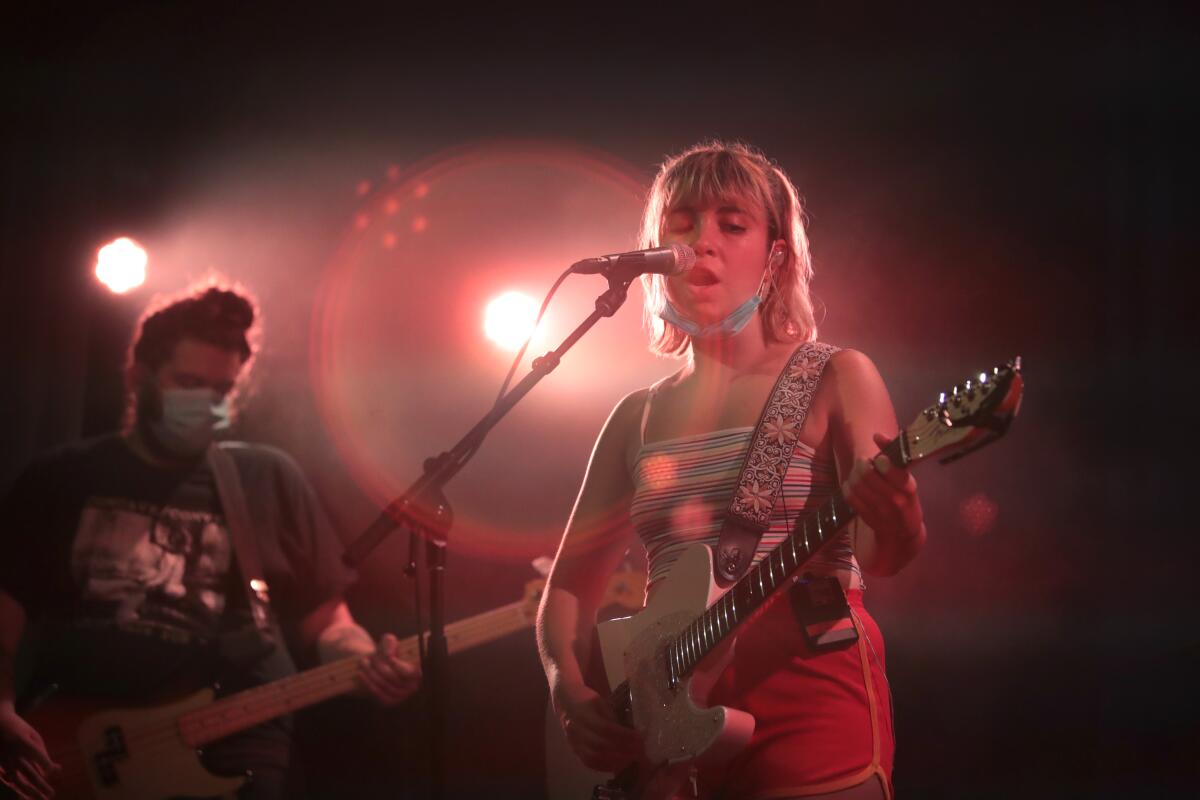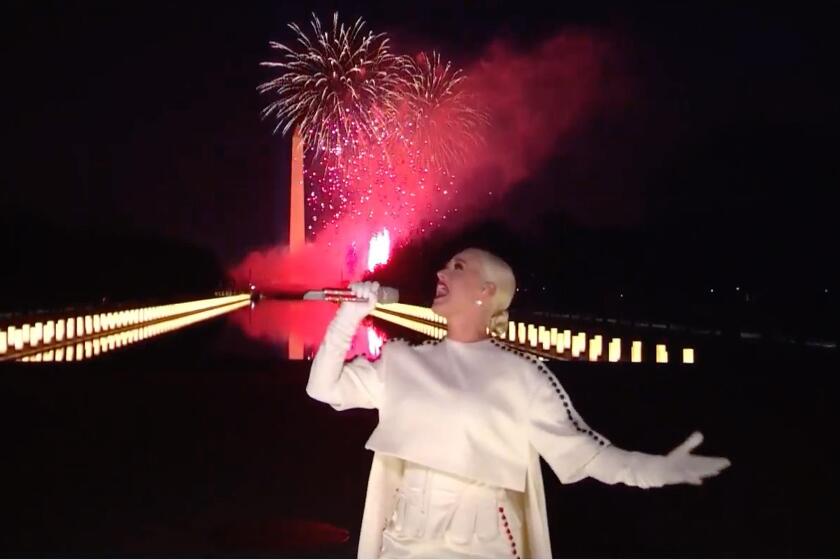Beach Bunny’s airborne pop-punk calls out toxic dudes, with irrepressible glee
Lili Trifilio of Beach Bunny laughingly recalls the enthusiasm with which she and her friends celebrated the New Year’s Eve before last.
“We were like, ‘2020! New decade! Best year ever!’” the singer and guitarist says.
The year to come, of course, had other plans.
Holed up in the English countryside, the producer, musician and visual artist has been busy reinventing Zoom and falling in love with music again.
Yet for all the turmoil that turned out to be in store, 2020 actually did end up a banner year for Beach Bunny, the smart indie-rock band Trifilio, 24, leads from her hometown of Chicago. Propelled by the success of its single “Prom Queen” — a vivid critique of punishing beauty standards that blew up on TikTok — Beach Bunny’s debut album, “Honeymoon,” cracked the upper reaches of Billboard’s alternative chart and earned rave reviews from Rolling Stone and the New Yorker.
In early March, the foursome hit Los Angeles for a pair of boisterous sold-out shows at the Roxy, where hundreds of sweaty young fans bumped up against one another as they danced, blissfully unaware that it would be ages before they did it again.

Now, Beach Bunny is starting 2021 with a slightly more seasoned optimism: On “Blame Game,” an excellent four-song EP that dropped last week (and quickly racked up 1 million combined streams on Spotify and YouTube), Trifilio and her bandmates — guitarist Matt Henkels, bassist Anthony Vaccaro and drummer Jon Alvarado — are still bashing out crunchy, catchy guitar pop with echoes of cult-fave ’90s groups like That Dog and more recent emo acts such as Paramore. The singer’s high, trilling voice gives the sturdy melodies an appealingly airborne quality.
But where Trifilio wrote plaintively on “Honeymoon” about romantic insecurity — “I’m sorry, I’m trying / I hate it when you catch me crying,” one track went — here she calls out emotionally unavailable dudes with wit and precision: “Say you want me,” she sings in the propulsive “Good Girls (Don’t Get Used),” her crisp enunciation cutting through Henkels’ fuzzy power chords, “Did you want a ribbon? / ’Cause I’m gonna need to hear more than that.”
A-listers from Katy Perry to Bruce Springsteen performed on Inauguration Day, but the COVID-19 crisis, and the darkness of the Trump years, muted the celebration.
Trifilio is on the phone from Chicago, where she attended an all-girls Catholic high school and later formed Beach Bunny while studying journalism at DePaul University. She attributes the shift in attitude to the ample time she had at home to reflect last year. Not long after those Roxy gigs, the band’s touring plans — including its first trip to Europe and what the singer called a “bucket list” appearance at Coachella — were called off because of the COVID-19 pandemic.
“I was in a pattern of toxic relationships during the ‘Honeymoon’ era,” she says she realized. “And I feel like a lot of the old songs had this theme of tolerance — like, I tolerate this bad behavior, even though it’s affecting me.’
“I was so consumed by it that writing a song seemed like the only option, because I knew I wasn’t gonna leave,” she adds, pointing as an example to “Cloud 9,” which closes Beach Bunny’s debut with a chorus “that’s basically saying, ‘When he says I’m pretty, I feel worth it.’”
Removing herself from those relationships during stay-at-home orders led her to look at the circumstances differently. “‘Cloud 9’ is framed as a love song, but when I listen to those lyrics now, I almost want to shake my past self: ‘You need to have self-worth beyond a person liking you,’” she said.
“Maybe these new songs are me trying to console my past self — and to be angry for her.”

Which doesn’t mean that that version of Trifilio doesn’t live on in Beach Bunny’s old music. The singer, who says she’s “not really in a relationship context” these days, remembers making a joke on Twitter about how some of her songs were “pathetic,” only to receive angry replies from fans who told her, “Those songs resonate with me so much — you can’t say that about them.’”
Interaction on social media has been an unsatisfying replacement for the face-to-face meetings Trifilio grew accustomed to having with her audience as Beach Bunny came up playing house shows in Chicago’s close-knit DIY punk scene. Before COVID-19, she says, “you’d talk to people after the show and they could tell you how a song affected them, and I’d get to tell them how grateful I was that they came.
“Now, I just look at the ‘likes’ and how many people are watching the music videos.”
Trifilio says she’s determined to stay off Twitter and Instagram in 2021, though she’s already backsliding — worse for her than for us, given her sharply funny internet presence. On Wednesday, as the Bernie Sanders inauguration meme took off, she asked her followers to make one that combined her band with the mitten-wearing Vermont senator, then retweeted some of the amusing results.
Before that, she wondered whether “any music journalist out there” understood that she’d taken less influence from “cool ’90s bands” than from 2007’s “Insomniatic” by the former Disney Channel sister duo Aly & AJ. (The best thing she’s heard lately, she says, is Miley Cyrus’ hard-rocking “Plastic Hearts,” which gives her hope that “grungy sounds can exist in a mainstream way and not just on alternative stations.”)
Vaccaro cops more directly to the ’90s inspiration, saying he’s “obsessed” with acts from that era, like Pavement and Sebadoh, that were signed to the indie labels Matador and Sub Pop.
“What we do, it’s like slacker rock,” he says, “but we’re trying our best.”
Asked if she’s checked out any of the many artists Beach Bunny has been compared to, Trifilio says she recently listened to Liz Phair on a reporter’s recommendation, then realized she already knew some of her fellow Chicagoan’s stuff.
“Maybe I heard it in Target or something,” she says.

With touring not yet on the table, Trifilio plans to spend some of her time this year on a solo side project, Tiger Lili, that she describes as a vehicle to experiment at home with folk and electronic music. But she’s eager to get back on the road as soon as it’s feasible: For all the thinking she does about gender and behavior in Beach Bunny’s carefully worded songs, the band is a raucous good time onstage, with shouty singalongs and even some old-school stage-diving.
Trifilio, who played sports as a kid, says that’s the natural result of growing up watching punk and emo bands. In college, she’d occasionally find herself at what she called “indie girl shows,” where “everybody would just be standing around, fiddling on their phones. It would make me really angry,” she says. “Being a woman in a male-dominated scene, I was like, ‘I want to be like the punk bros.’
“I want to teach little girls to get rowdy in a safe way.”
More to Read
The biggest entertainment stories
Get our big stories about Hollywood, film, television, music, arts, culture and more right in your inbox as soon as they publish.
You may occasionally receive promotional content from the Los Angeles Times.












